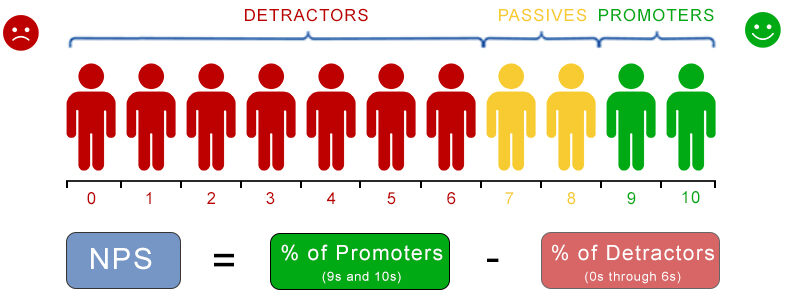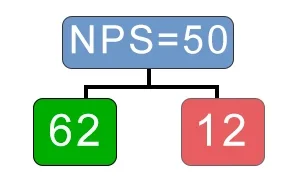
Net Promoter Score® (NPS) is a metric used for measuring customer loyalty and satisfaction. It is based on the simple question of “How likely are you to recommend us to a friend or colleague?”.
NPS was originally introduced in 2003 by Fred Reichheld in a Harvard Business Review article titled “The One Number You Need to Grow”. Reichheld argues that NPS® can be used as a key performance indicator (KPI) for growth as NPS measures customer loyalty, an integral part of any business. The powerful metric is used in multiple industries and by over two thirds of Fortune 1000 companies across the world.
How to calculate NPS
Answers to the question “How likely is it that you would recommend us to your friends or colleagues?” are based on a scale from 0 to 10 where 0 represents “extremely unlikely” and 10 “extremely likely”. Based on their answers, the customers are classified into the three following groups:
- Detractors: Score 0-6 – dissatisfied, non-returning customers
- Passives: score 7-8 – neutral, somewhat satisfied customers
- Promoters: score 9-10 – happy, loyal customers
The NPS is then calculated by subtracting the percentage of detractors from the percentage of promoters. NPS can range from -100 to +100, although a positive score is more common.
Net Promoter Score (NPS) = % Promoters – % Detractors.
Ex: The hotel had 62% promoters, 26% passives and 12% detractors. The NPS score would be 50 (62% – 12%).

Why is NPS Important?
In the hospitality industry where word-of-mouth is crucial, NPS becomes especially important. Only guests that had a great experience with above average service are likely to return again. Therefore hotels with a very high NPS can feel confident that their business model is working. It is a measurement of guest satisfaction and allows hotels to see how it changes over time. Hotels that successfully integrate guest feedback are likely to see their NPS continue to increase, while hotels that fail to do so may see a negative curve.
NPS is sometimes criticised for being a very harsh grading scale. It’s rare that someone giving a score of 6 out of 10 is seen as a negative and that only scores of 9 or 10 contribute positively, but it’s part of what makes the NPS unique. Only the absolutely top hotels will be able to boast about their hight NPS while the rest can easily see how they still have work to do.
Collecting Guest Feedback
The first step is to begin to ask your guests the question of “How likely are you to recommend the hotel to friends or colleagues?”. An easy way to do so is through sending out Post-Stay surveys once the guest has checked out. Loopon offers easy-to-answer surveys with high response rates.

Improving your Hotel’s NPS
Are you dissatisfied with your hotel’s NPS score? Asking additional question to figure out the reason as to why some of your guests are “detractors” is a good starting spot. Was it the service, price, room, food? Are the beds too uncomfortable? Poor breakfast alternatives? Overpriced spa?
Collecting more data will allow your hotel to see where and how to improve. Another good place to look could be the “passives”. They are not dissatisfied with the hotel and are more likely to turn into promoters. Don’t completely ignore the “promoters” either as you want to make sure that they stay return again and continue to recommend the hotel to their friends and colleagues.
Loopon offers a completely digitalized guest journey where collecting, analysing and improving on feedback is at the center. By gathering all feedback in one place and providing an advanced Reputation Management system, your hotel can improve Guest Satisfaction and NPS.
Net Promoter, NPS®, and Net Promoter Score are trademarks of Satmetrix Systems, Inc., Bain & Company, Inc., and Fred Reichheld.